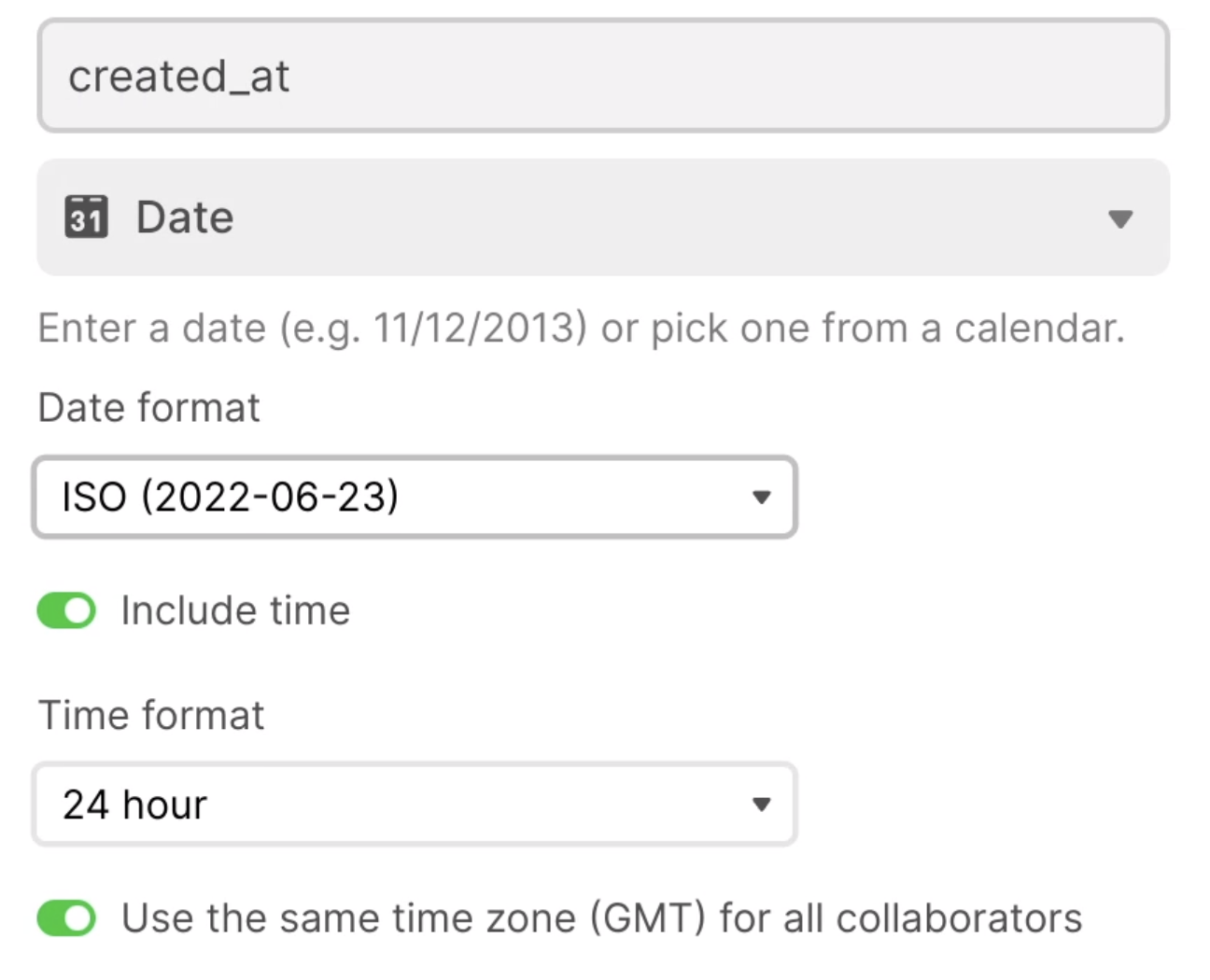Status: Live
Basics
Airtable is a highly functional spreadsheet tool that functions similarly to a relational database. In fact, many young companies use Airtable as their sole source of truth at first! With Bracket, you can sync any Airtable base with- Any SQL database
- Any NoSQL database, and/or
- Notion/Google Sheets
Supported and partially supported fields
The following Airtable field types are currently supported:- Single line text
- Long text
- Date
- Phone number
- Currency
- Multi-select
- Single select
- Collaborator
- Checkbox
- Number
- Last modified by
- Created time
- URL
- Percent
- Duration
- Autonumber*
- Rollup*
- Count*
- Formula*
- Linked record**
- Lookup***
Unsupported fields
The following Airtable fields are not yet supported:- Attachment
- Button
- Barcode
- Rating
Dates and times
We recommend formatting your date fields in Airtable with the following settings before Bracket starts syncing:
Supported sync configurations
We know everybody has a different use case for Bracket, and we want to help you achieve it! To that end, we support a number of possible syncing configurations.| Property | Support |
|---|---|
| Number of Airtable tabs and number of linked databases | We can link any number of Airtable tabs to any number of database tables/collections. Many:1, 1:many, many:many, and 1:1 are all supported. |
| Number of fields within an Airtable tab synced | We can sync any full set or subset of fields within an Airtable tab to corresponding fields in the database(s). |
| Bidirectional vs. unidirectional syncs | Of the synced fields, we can define each as unidirectional or bidirectional. That is, an Airtable field can solely read, solely write, or read and write. This helps teams establish implicit permissions over database write access. |
| Filtering data to stay within Airtable row limits | You can set logic such that Airtable is only reading and writing data within specific parameters, e.g. the last 7 days’ worth of data from the linked database. This helps teams leverage Airtable without hitting row limits. |
Schema changes
There are several possible schema changes you can make in Airtable. Below, we cover whether these changes break syncing for the entire table and how to handle these changes with a Bracket-connected Airtable.| Type of change | Will this break syncing? | What to do |
|---|---|---|
| Adding field that does not need to be synced (i.e., an Airtable-only field) | No | Nothing |
| Deleting a field that is not synced | No | Nothing |
| Changing the name or field type of a field that is not synced | No | Nothing |
| Changing order of fields | No | Nothing (note that this will not change the order of the rows or documents in the linked database). |
| Adding an option to a multi-select or single select field | No | Nothing - this new option will be added to the paired database when used for the first time. |
| Adding a field you would like to sync | No | The field will not sync until you let us know to start syncing it with the paired database. Ping us on Slack and we’ll set it up right away! |
| Changing name or case of existing synced field | Yes | Notify the Bracket team via Slack. We will update the connection immediately. If a team member unknowingly makes a change that breaks syncing, we will notify you via Slack to confirm the new schema, then update the connection. |
| Changing field type of existing synced field (e.g., single line text -> multi-select) | Yes | Same as above |
| Deleting a synced field | Yes | Same as above |
Row changes
When you change rows in a linked Airtable, certain changes happen in the paired database. Below we list out the default outcome of changes to rows in a synced Airtable tab. To customize any of these default outcomes, just tell us on Slack.| Type of change | Default outcome | Customizable? |
|---|---|---|
| Adding row | 1. Creates new row in spreadsheet 2. Creates new row in SQL database 3. Creates new document in NoSQL database Note: the document is created as soon as a new record in Airtable is created, not when fields are populated. If you create a new empty row, it will generate an empty document in the database. | Yes |
| Editing row | If edits are made in a synced field, then edit is pushed to the paired database. Otherwise, the edit only exists in Airtable. | Yes |
| Deleting row | This does not delete the equivalent row or document in the paired database. | Yes |

